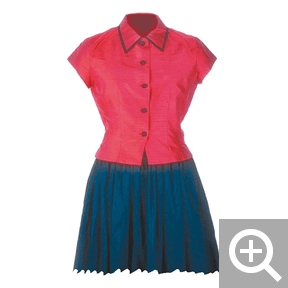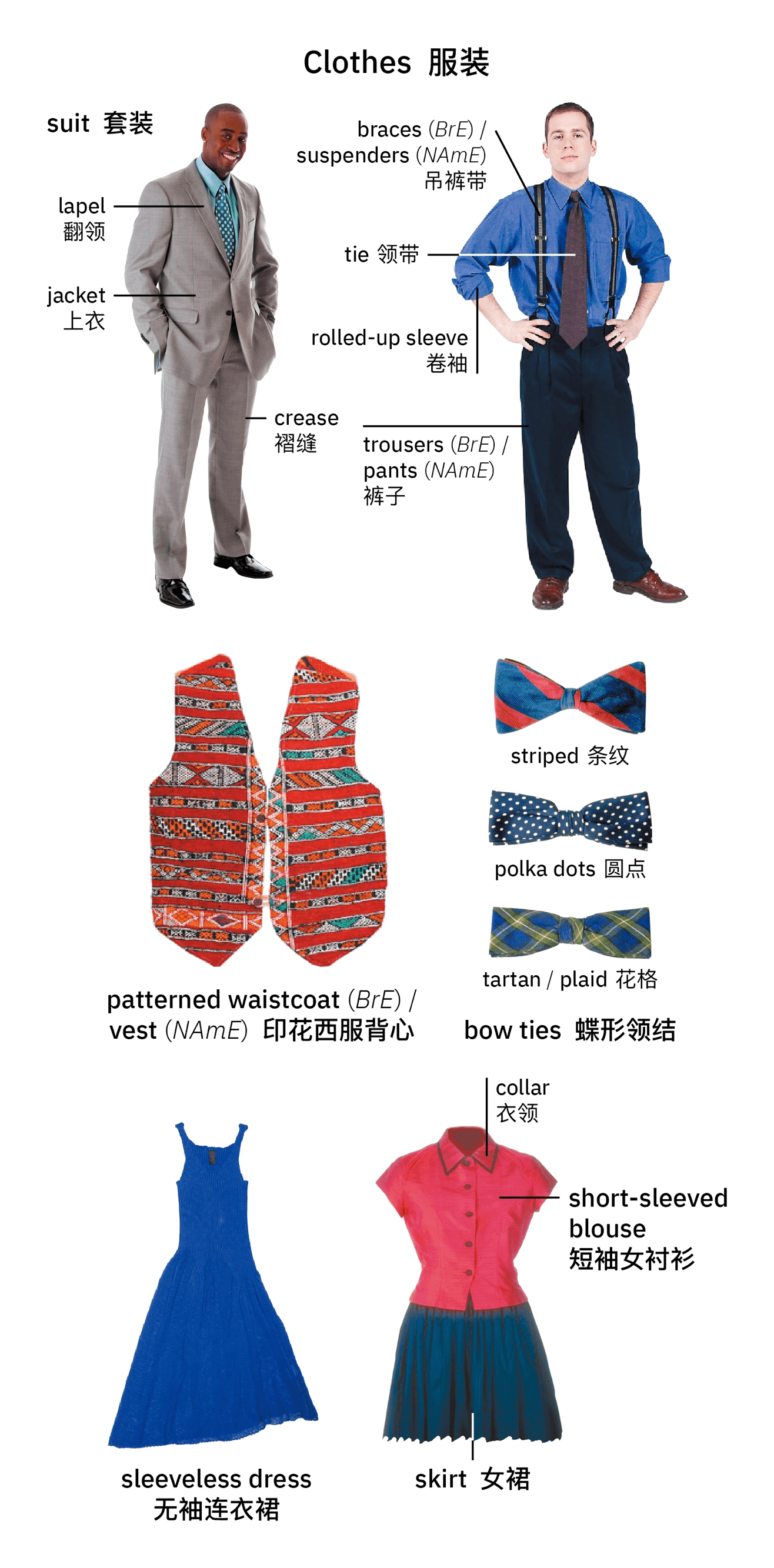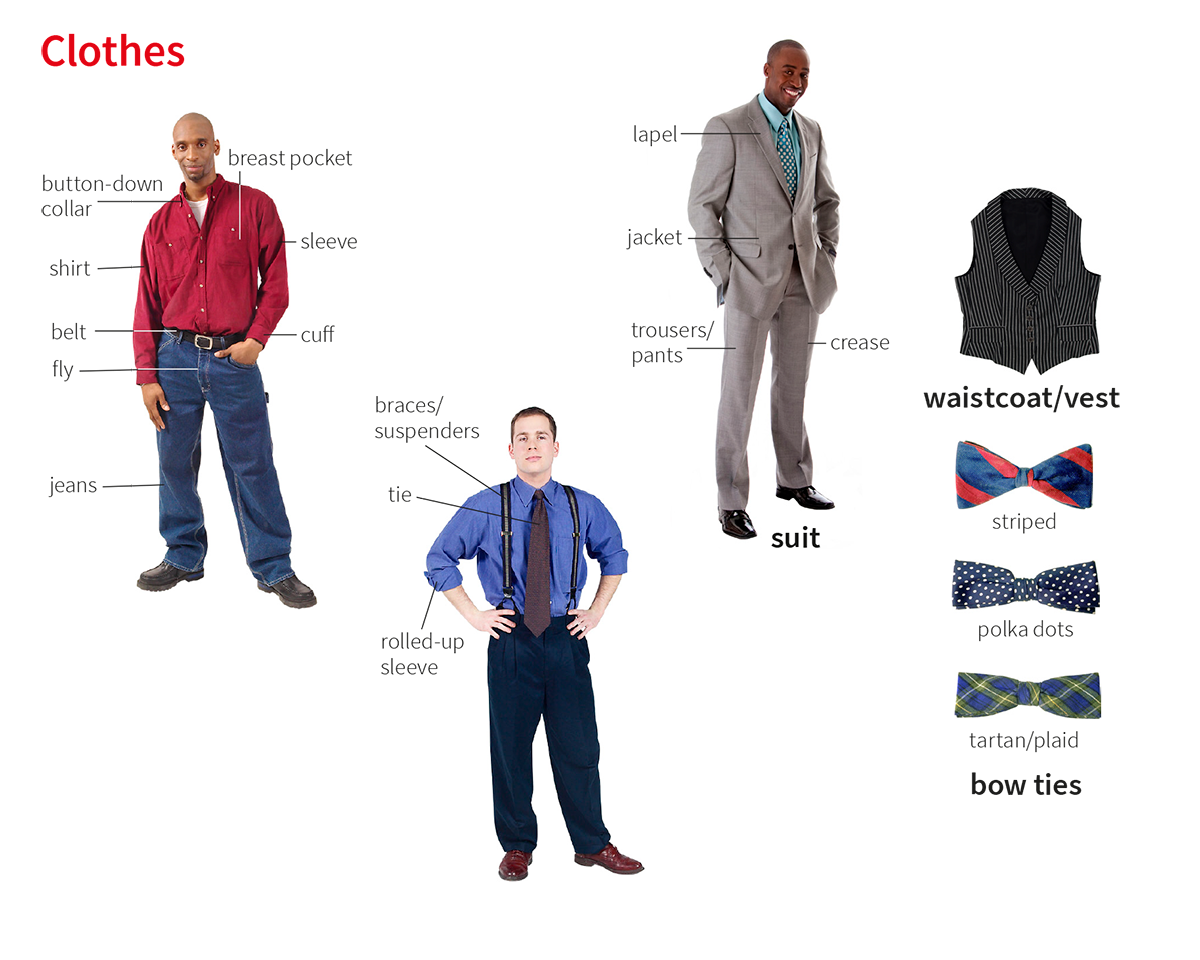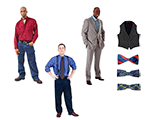the things that you wear, such as trousers, dresses and jackets 衣服;服装 

I bought some new clothes for the trip. 我为这次旅行买了一些新衣服。 They were dressed in designer clothes (= clothes designed by famous fashion designers). 他们穿着名牌服装。 to put on/take off your clothes 穿上/脱下衣服 clean/dirty clothes 干净/脏衣服 a police officer in civilian clothes (= not in uniform) 便衣警察 work clothes (= for wearing to work) 工作服。 She was wearing casual clothes. 她穿着便装。 maternity/baby clothes (= for pregnant women/babies) 孕妇装/婴儿装 winter/summer clothes 冬装/夏装 a clothes shop 服装店 She has no clothes sense (= she does not know what clothes look attractive). 她不懂穿着打扮。 Bring a change of clothes with you. 你要带上一套换洗衣服。
Synonyms clothesclothes 衣服 - clothing
- garment
- dress
- wear
- gear
- clothes [pl.] the things that you wear, such as shirts, jackets, dresses and trousers.
- clothing [U] (rather formal) clothes, especially a particular type of clothes:
warm clothing 保暖服
clothes or clothing? 用 clothes 还是 clothing? - garment (formal
) a piece of clothing: 指一件衣服: He was wearing a strange shapeless garment. 他穿着一件不成形的奇怪衣服。
- dress [U] clothes, especially when worn in a particular style or for a particular occasion:
We were allowed to wear casual dress on Fridays. 我们在星期五可以穿便服。
- wear [U] (usually in compounds) clothes for a particular purpose or occasion, especially when they are being sold in shops:
the children’s wear department 童装部
- gear [U] (informal) clothes:
Her friends were all wearing the latest designer gear. 她的朋友都穿着最新的名牌服装。
- casual clothes/clothing/dress/wear/gear
- evening/formal clothes/dress/wear
- designer/sports clothes/clothing/garments/wear/gear
- children’s/men’s/women’s clothes/clothing/garments/wear
- to have on/be in/wear …clothes/garments/dress/gear
Culture formal and informal dressformal and informal dressIn general, people in Britain and the US dress in a fairly informal way. Many wear casual clothes most of the time, not just when they are at home or on holiday. Men and women wear jeans or other casual trousers with a shirt or T-shirt and a sweater to go shopping, meet friends, go to a pub or bar, or take their children out. Older people are more likely to dress more smartly, with women wearing a dress or skirt and blouse, and men a shirt, jacket and trousers, when they go out. In summer people may wear shorts (= short trousers), but these are not usually considered appropriate for work in an office.Many people dress up (= put on smart clothes) to go to a formal party or an expensive restaurant. Young people are most interested in following fashion and regularly buy new clothes.Men wear suits, and women wear suits or dresses, for formal occasions like funerals or interviews for jobs. Some wear suits or smart clothes every day because their employer expects it or because they think it makes them look more professional. Most people prefer more casual, comfortable clothes for work but some companies do not like people wearing jeans. Employees in banks and shops often have uniforms.For very formal occasions during the day, such as a wedding, men may wear morning dress. This includes a jacket with long ‘tails’ at the back, dark grey trousers and a grey top hat. Women wear a smart dress and perhaps a hat. For very formal events in the evening, men may wear evening dress, also called white tie, which consists of a black tailcoat, black trousers, a white waistcoat, white shirt and white bow tie. Women usually wear a long evening dress or ball gown. Usually for formal evening events men wear black tie or a tuxedo, consisting of a black dinner jacket, black trousers and a black bow tie.Collocations Clothes and fashionClothes and fashion 服装与时尚 Clothes 衣服 - be wearing a new outfit/bright colours/fancy dress/fur/uniform
穿着一身新衣裳/鲜艳的服装/化装舞会服/毛皮衣服/制服 - be (dressed) in black/red/jeans and a T-shirt/your best suit/leather/silk/rags (= very old torn clothes)
穿着黑色衣服/红色衣服/牛仔裤和 T 恤/最好的西服/皮衣/丝绸衣服/破衣烂衫 - be dressed for work/school/dinner/a special occasion
穿好衣服准备上班/上学/赴晚宴/出席特殊场合 - be dressed as a man/woman/clown/pirate
打扮成男人/女人/小丑/海盗 - wear/dress in casual/designer/second-hand clothes
穿休闲服/名牌服装/二手衣服 - wear jewellery/accessories/a watch/glasses/contact lenses/perfume
- have a cowboy hat/red dress/blue suit on
戴着牛仔帽;穿着红色连衣裙/蓝色西服 - put on/take off your clothes/coat/shoes/helmet
穿上/脱下衣服/外套/鞋子;戴上/取下头盔 - pull on/pull off your coat/gloves/socks
穿上/脱下外套;戴上/脱下手套;穿上/脱下袜子 - change into/get changed into a pair of jeans/your pyjamas
Appearance 外貌 - change/enhance/improve your appearance
改变/提升/改善形象 - create/get/have/give something a new/contemporary/retro look
塑造/获得/拥有/给某物以新的/现代的/复古的外貌 - brush/comb/shampoo/wash/blow-dry your hair
梳/用洗发剂洗/洗/吹头发 - have/get a haircut/your hair cut/a new hairstyle
理发;换一个新发型 - have/get a piercing/your nose pierced
穿孔;穿鼻孔 - have/get a tattoo/a tattoo done (on your arm)/a tattoo removed
有纹身;在(胳膊上)刺花纹;去除纹身 - have/get a makeover/cosmetic surgery
做整容手术 - use/wear/apply/put on make-up/cosmetics
使用化妆品;化妆
Fashion 时尚 - follow/keep up with (the) fashion/the latest fashions
追求时尚;赶时髦 - spend/waste money on designer clothes
把钱花在/浪费在名牌服装上 - be fashionably/stylishly/well dressed
衣着时尚/新潮/考究 - have good/great/terrible/awful taste in clothes
着装很有品味/品味很差 - update/revamp your wardrobe
更新服装 - be in/come into/go out of fashion
流行;开始流行;不再流行 - be (back/very much) in vogue
(又开始/非常)流行 - create a style/trend/vogue for something
为…创造了一种风格/趋势/潮流 - organize/put on a fashion show
策划/举办时装秀 - show/unveil a designer’s spring/summer collection
展示/首次推出一位设计师的春/夏装系列 - sashay/strut down the catwalk/(North American English also) runway
走 T 型台 - be on/do a photo/fashion shoot
做专业摄影/时装摄影
Extra ExamplesTopics Clothes and Fashiona1He wore his best clothes to the interview. 他穿上他最好的衣服去参加面试。 I'm going to take a set of clean clothes with me. 我要带一套干净衣服。 She didn't recognize him in his everyday clothes. 他穿着日常的衣服,她没有认出他来。 a new suit of clothes for the baby 给婴儿的一套新衣服 I quickly threw on some clothes and ran downstairs. 我匆忙穿上衣服跑下楼去。
Oxford Collocations Dictionaryadjective- beautiful
- elegant
- fancy
- …
- set
- suit
- pull on
- put (back) on
- remove
- …
- shop
- store
- designer
- …
- in clothes
- a change of clothes
Word OriginOld English clāthas, plural of clāth, related to Dutch kleed and German Kleid, of unknown ultimate origin.
Idioms
the emperor's new clothes
(also the emperor has no clothes)
used to describe a situation in which everybody suddenly realizes that they were wrong to believe that somebody/something was very good, important, etc. 原来皇帝没有穿衣服;恍然大悟;如梦初醒


